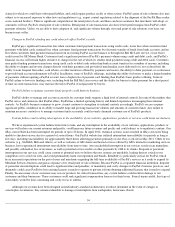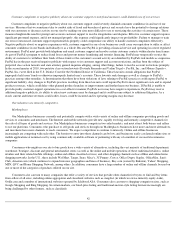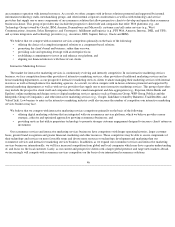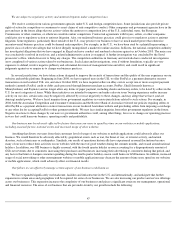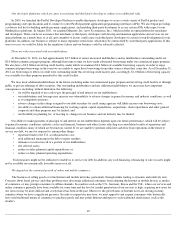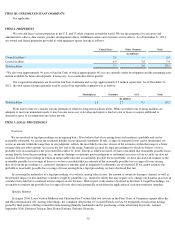eBay 2012 Annual Report Download - page 45
Download and view the complete annual report
Please find page 45 of the 2012 eBay annual report below. You can navigate through the pages in the report by either clicking on the pages listed below, or by using the keyword search tool below to find specific information within the annual report.
Our classifieds websites, including Den Blå Avis, BilBasen, eBay Classifieds (including eBay Anuncios, eBay Kleinanzeigen and eBay
Annunci), Gumtree, Kijiji, LoQUo, Marktplaats.nl, mobile.de and Alamaula, offer classifieds listings in the U.S. and a variety of local
international markets. In many markets in which they operate, including in the U.S., our classified platforms compete against more established
online and offline classifieds platforms.
Our online shopping comparison site, Shopping.com, competes with sites such as Google Shopping, Bing Shopping, Buy.com,
Nextag.com, Pricegrabber.com, Shopzilla, Buscapé in Latin America (owned by Naspers) and Yahoo! Product Search, which offer shopping
search engines that allow consumers to search the Internet for specified products. In addition, sellers are increasingly utilizing multiple sales
channels, including the acquisition of new customers by paying for search-related advertisements on horizontal search engine sites such as Bing,
Google, Yahoo!, Naver and Baidu. We use product search engines and paid search advertising to help users find our sites, but these services also
have the potential to divert users to other online shopping destinations. Consumers may choose to search for products and services with a
horizontal search engine instead of our sites, and horizontal search engines may send users to other shopping destinations instead of our sites.
Consumers and merchants who might use our sites to sell goods also have many alternatives, including general online ecommerce sites
such as Amazon and Etsy, and more specialized sites. Our international sites also compete for sellers with general online ecommerce sites such
as: Amazon, Rakuten.de, Quelle and Otto in Germany; Leboncoin.fr and PriceMinister (owned by Rakuten) in France; Taobao in China; Tradus
(owned by Naspers) in Poland; Yahoo-
Kimo in Taiwan; Lotte, Naver and 11th Street in South Korea; Trading Post, OZtion and Aussie Bidder in
Australia; and Amazon and Play.com (owned by Rakuten) in the United Kingdom and other countries. Our sellers may choose to sell their goods
through other channels, such as classifieds sites. Consumers and merchants also can create and sell through their own sites, and may choose to
purchase online advertising instead of using our services. In some countries, there are online sites that have larger customer bases and greater
brand recognition than we do, as well as competitors that may have a better understanding of local culture and commerce than we do. As our
businesses in developing countries grow, we increasingly may compete with domestic competitors that have advantages we do not possess, such
as a greater ability to operate under local regulatory authorities.
The principal competitive factors for Marketplaces include the following:
With respect to our online and mobile competition, additional competitive factors include:
We may be unable to compete successfully against current and future competitors. Some current and potential competitors have longer
operating histories, larger customer bases and greater brand recognition in other business and Internet sectors than we do. Other online
ecommerce sites may be acquired by, receive investments from, or enter into other commercial relationships with well-established and well-
financed companies. As a result, some of our competitors with other revenue sources may be able to devote more resources to marketing and
promotional campaigns, adopt more aggressive pricing policies and devote more resources to website, mobile application and systems
development than we can. Some of our competitors may offer or continue to offer free shipping, favorable return policies or other transaction-
related services which improve the user experience on their sites and which could be impractical or inefficient for eBay sellers to match. Our
competitors may be able to innovate faster than we can, and new technologies may further increase the competitive pressures by enabling our
competitors to offer more efficient or lower-cost services. Our competitors may be able to use the advantages of brick-and-mortar stores or other
sorts of physical presence.
In addition, certain manufacturers may limit or cease distribution of their products through online channels such as eBay. Manufacturers
may attempt to use existing or future government regulation to prohibit or limit online commerce in certain categories of goods or services.
Manufacturers may also attempt to enforce minimum resale price maintenance or minimum advertised price arrangements to prevent distributors
from selling on our websites or on the Internet generally, or at prices that
43
•
ability to attract, retain and engage buyers and sellers;
•
volume of transactions and price and selection of goods;
•
trust in the seller and the transaction;
•
customer service; and
•
brand recognition.
•
community cohesion, interaction and size;
• website or mobile application ease-of-
use and accessibility;
•
system reliability;
•
reliability of delivery and payment;
•
level of service fees; and
•
quality of search tools.



